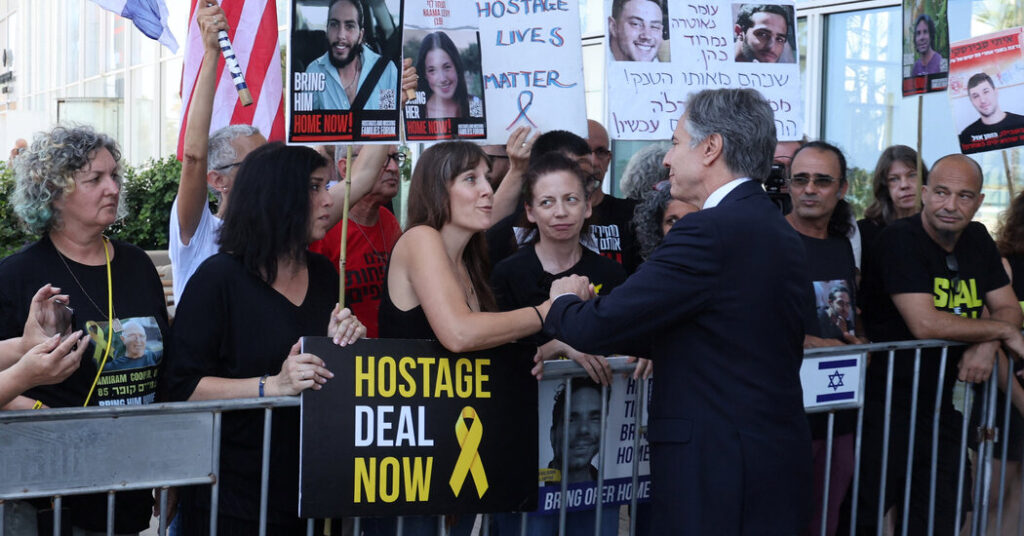hot news
U.S. Secretary of State Antony Blinken said on Tuesday that the world was awaiting a response from the leader of Hamas, a day after the U.N. Security Council approved a U.S.-backed ceasefire proposal in Gaza.
Blinken placed the blame squarely on Yahya Sinwar, Hamas’ top Gaza official, telling reporters in Tel Aviv whether the group’s acceptance of the deal was in the best interests of the Palestinian people. At the very least, it would halt the fighting and allow more humanitarian aid to flow into Gaza, he said.
Alternatively, he said, Hamas might “take care of one individual,” Mr. Sinwar, who is believed to be hiding underground in Gaza “while the people he claims to represent continue to suffer in the crossfire of his own making.”
The top US diplomat, seeking to focus public attention on Sinwar during his eighth wartime visit to Israel, said the fate of the US-backed ceasefire plan “really depends on one person right now”. But he also met with Israeli leaders, who have not publicly supported the proposal (which President Biden has described as an Israeli proposal) or said they would abide by the agreement if Hamas accepts it.
Blinken said after meeting with Israeli Prime Minister Benjamin Netanyahu on Monday that he had received clear assurances that he supported the proposal, even though the Israeli leader last week floated the idea of a negotiated permanent ceasefire that Hamas said to negotiate a permanent ceasefire), raising suspicions.
Mr Netanyahu has said he will not accept any deal that ends the war before Hamas’s military and governance capabilities are destroyed, although experts have expressed doubts that those goals can be achieved.
The resolution passed by the Security Council called for an immediate ceasefire and negotiations to permanently end the fighting, and said it would extend the temporary truce if negotiations took longer than six weeks. That appears to open the door to an extended lull in the war, something some Israeli leaders have been reluctant to accept.
Blinken stressed that “the commitment to agreeing to this proposal is to seek a lasting ceasefire,” adding: “But this must be negotiated.”
In addition to an immediate ceasefire, the first phase of the three-phase deal calls for the release of all hostages held in Gaza in exchange for more Palestinians held in Israeli jails, the return of displaced Gazans to their homes and a full withdrawal of Israeli troops the territory.
The second phase calls for a permanent ceasefire by mutual consent. The third phase will include a multi-year reconstruction plan for Gaza and the return of the remains of deceased hostages.
Blinken spoke on the terrace of a seaside hotel in Tel Aviv, surrounded by several relatives of Israeli hostages held in the Gaza Strip, with whom he had just met briefly. Some held signs with photos of loved ones and the words “Bring Them Home.”
Blinken said Monday’s unanimous vote by the Security Council showed that Hamas would be isolated if it did not agree to the proposed deal. Blinken said the resolution “makes it as clear as possible that this is what the world is looking for.”
In a statement on Monday, Hamas said it “welcomes the contents of the Security Council resolution, which confirms a permanent ceasefire in Gaza, complete withdrawal of troops, exchange of prisoners, reconstruction, return of displaced persons to their areas” of residence, rejecting any move in the Gaza Strip. Demographic changes or reductions, and the provision of needed assistance to the people of Gaza.
Blinken called the announcement “a hopeful sign.” But he added that what mattered was “the words of the leader of Hamas in Gaza” – namely Mr Sinwar.
Blinken spoke to reporters before traveling to Amman, Jordan, where he is scheduled to attend a meeting on humanitarian aid in Gaza. He also met with Israeli opposition leaders Yair Lapid and Benny Gantz on Tuesday morning. emergency government to protest Netanyahu’s handling of the war.

